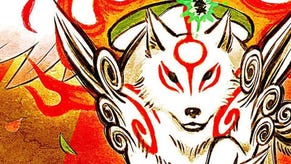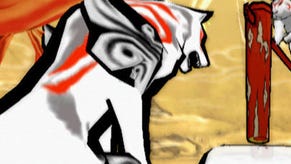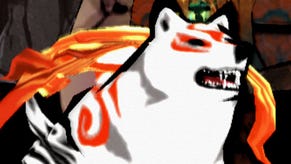Okami
Stroke of genius.
Modern art
Thanks to a pleasantly gentle learning curve, getting up to speed with how and when you use the brush is handled very well. By the time you're making decent progress with the game, the sheer breadth of contextual options available to you during combat, in particular, makes it an intriguing and unique game to play - and the feeling of satisfaction when you've dispatched a particularly troublesome foe is palpable. All it requires is often a little imagination on your part.
That said, if there's one thing that threatens to derail Okami from scooping the 10 it so richly deserves, it's the occasionally unreliable nature of whether it 'understands' your brush strokes or not. Although even the most intense battles rarely require complex strokes from the player, the game will sometimes mis-read your intentions - especially when trying to perform otherwise routine brush strokes. Simple acts like the powerstroke can be simply ignored in the heat of combat (usually as a result of your own wavering touch, but still), and, likewise, basic environmental tasks such as blooming (where you draw a circle around a dead tree or a patch of lifeless ground) will fail unless you draw them where the game wants you to, forcing you to have to draw the same thing over and over until it works. The problem is mainly that the PS2 pad just isn't the right tool for the job, and partly because our hands are rubbish; in fact, Okami's ideas would have worked far better on the Wii, but that's never going to happen, now, is it?
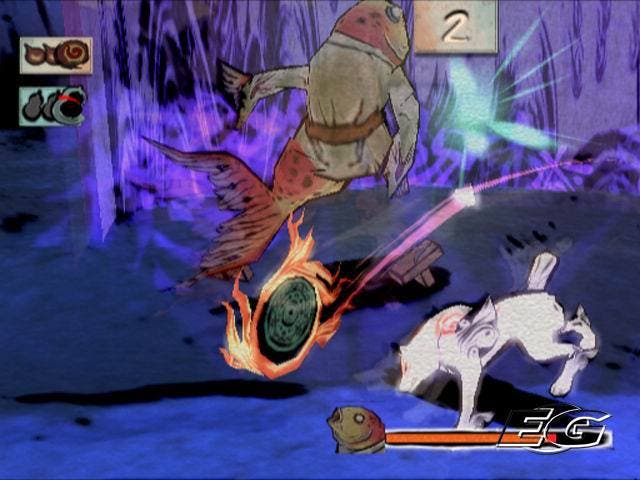
Using your brush techniques is only part of the story, though. In many respects, Okami sticks to tried and trusted action adventure controls and mechanics, and these definitely help make it feel less like a quirky experiment, and more like something that's building on extremely solid foundations. For example, movement and camera controls stick to the sensible two stick method that most third person games utilise these days, with X to jump, square to slash, triangle to block and circle to fire projectiles. In fact, most of the early combat encounters allow you to slash wildly - but soon you'll face enemies who can block indefinitely - until you bother to power slash their shield, for example. Weapons gradually play more of a part as the game goes on, but throughout you'll have the choice of a main and a sub weapon, which can also be powered up as you buy gold dust at the various merchants that you'll encounter along the way. In addition, you'll be able to learn new, increasingly powerful combo moves at the Dojo, while garnering praise for your good deeds allows you to power-up in other ways, such as increasing your reserves of health and ink. The latter, in particular, becomes more important as powerful brush moves drain a greater quantity of your ink reserves. But like everything in Okami, the rate of progression is judged so well that by the time you need greater powers, you'll most likely have already powered yourself up anyway.
Dig it
But like many epic games, Okami rewards players who are thorough in numerous ways. Feeding animals and birds, for example, gains you praise points, as does making sure you restore withered trees to full bloom, not to mention the endless amount of treasure you can dig up and uncover if you're determined. Such tasks never feel like a chore, though. It's the kind of game where you'll happily while away the hours doing very little, because the actual process of finding treasures and restoring the landscape is calming in its own strange way, and actually beneficial to your overall progress in the long run. It's probably one of the nicest games you'll ever come across, but never in a nauseating or tedious way.
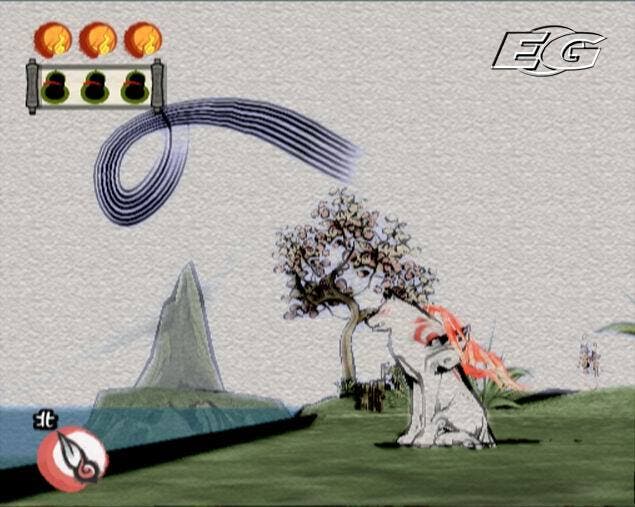
As flowery as Okami might look on the outside, there's a menacing underbelly around every corner. If you're not careful, you can end up straying into the game's equivalent of a random battle, where a wafting green flag can suddenly trap you inside a mini-arena battle to the death. Happily, these don't ever take that long to finish off, and do earn you money, so it's not all bad. Inevitably, there are tons of mandatory encounters with a handful of enemies that similarly trap you within the confines of a small arena - but after a while you'll have so many cool ways to fight back that the combat actually becomes much more interesting than ever seemed possible. Boss encounters, in particular, have an excellent knack of forcing you to be imaginative with your abilities, and - as a result - offer some of the most memorable (and some of the most frustrating) parts of the game. Bizarrely, the first boss you'll encounter proves to be one of the most taxing - mainly because of the previously discussed control limitations, but also because the camera sometimes just isn't flexible enough to give the player the angle they need to do the job. (You'll know what we mean when you get there).
But no amount of landscape evilry or multi-headed bosses can compete with the challenge of actually playing through the entire game. Estimates put the figure at around 60 hours, which is about four to six times the size of most console games these days (though pretty much on a par with Zelda, obviously). Normally when Mr Publisher spouts "60 hour epic" in our faces, we roll our eyes collectively to the heavens and redirect the jiffy bag to the nearest Japanophile. You might say to yourself that you haven't got the time, the will or the inclination to fight your way through endless battles in order to see what these games have to offer - but when you come across a game a packed full of quality moments as Okami, you'll be grateful that the developers went to such incredible lengths. You'll also be delighted with the little things, like being able to save regularly, and the wishpools that let you teleport between areas, and the fact that dying in the game isn't too much of a big deal because it always checkpoints extremely sensibly. You'll admire the fact that the game's challenging without being annoying, and those silly little 2D digging minigames. And the fishing. And the fact that pressing X repeatedly while the game's loading actually rewards you for your impatience. There are so many nice touches about Okami you'll wonder how on Earth Clover Studios could be shut down after making one of the best games Capcom has ever released. No justice.
Okami is, without doubt, a landmark game, and one that's beautiful in almost every sense. A few very minor control and camera issues occasionally threaten to gnaw away and the ankles of the design perfection running rampant throughout the game, but even they can't possibly undermine what is a fantastic achievement that may not be topped in the genre for some time. Right from the start it conjures an atmosphere of being something special, but to keep that level of quality up consistently over 60 hours ensures that this will be a game that will be talked about for years to come.
A work of art, you might say.

